APIs are the backbone of modern applications. But when they lag or fail under heavy load, businesses lose money and users lose trust. That’s why performance testing is critical - ensuring APIs can handle real-world conditions without breaking a sweat.
Here’s a quick rundown of the 10 best tools for API performance testing. Each tool caters to different needs, from open-source options to enterprise-grade solutions:
- Apache JMeter: Open-source, supports REST, SOAP, GraphQL, and more. Great for large-scale load testing with CI/CD integration.
- Loadero: Cloud-based, focuses on browser and WebRTC testing, ideal for distributed teams.
- Insomnia: Open-source, versatile protocol support (REST, GraphQL, gRPC), but better suited for smaller-scale testing.
- Karate Labs: Combines API, UI, and performance testing with a BDD approach. Easy for teams to collaborate.
- Selenium: Known for browser automation but can validate backend performance when paired with other tools.
- Cypress: Best for REST API testing in modern web apps; limited for heavy loads.
- Postman: User-friendly for functional testing; moderate load testing with Newman CLI.
- k6: Developer-friendly, JavaScript-based, and scalable for large load tests with cloud options.
- Gatling: Built for high-performance testing; excels at simulating massive user loads.
- ReadyAPI: Enterprise-grade, supports diverse protocols like Kafka and gRPC, with advanced features for large teams.
Quick Comparison
| Tool | Protocol Support | CI/CD Integration | Best For | Pricing |
|---|---|---|---|---|
| Apache JMeter | REST, SOAP, GraphQL | Jenkins, GitLab CI | Enterprise load testing | Free |
| Loadero | HTTP, WebRTC | GitHub Actions | Browser testing | Subscription |
| Insomnia | REST, GraphQL, gRPC | Limited | Small-scale testing | Freemium |
| Karate Labs | REST, SOAP, GraphQL | Jenkins, Maven | BDD testing | Free |
| Selenium | Web protocols | Jenkins, Azure DevOps | Web application testing | Free |
| Cypress | REST, GraphQL | GitHub Actions, Jenkins | Modern web apps testing | Freemium |
| Postman | REST, GraphQL, gRPC | Newman CLI | API collaboration | Freemium |
| k6 | REST, WebSockets | Jenkins, GitHub Actions | Scalable load testing | Freemium |
| Gatling | REST, WebSockets | Jenkins, Maven | High-performance testing | Free/Enterprise |
| ReadyAPI | REST, SOAP, gRPC, Kafka | Jenkins, Docker | Enterprise API testing | Commercial |
Key takeaway: Choose the tool that matches your team’s expertise, testing needs, and budget. For large-scale enterprise testing, tools like JMeter and ReadyAPI shine. For cost-effective, developer-friendly solutions, consider k6 or Postman. Always align the tool with your testing goals for the best results.
#AskRaghav | Comparing the most popular Performance Testing Tools | Let's Find Out
1. Apache JMeter
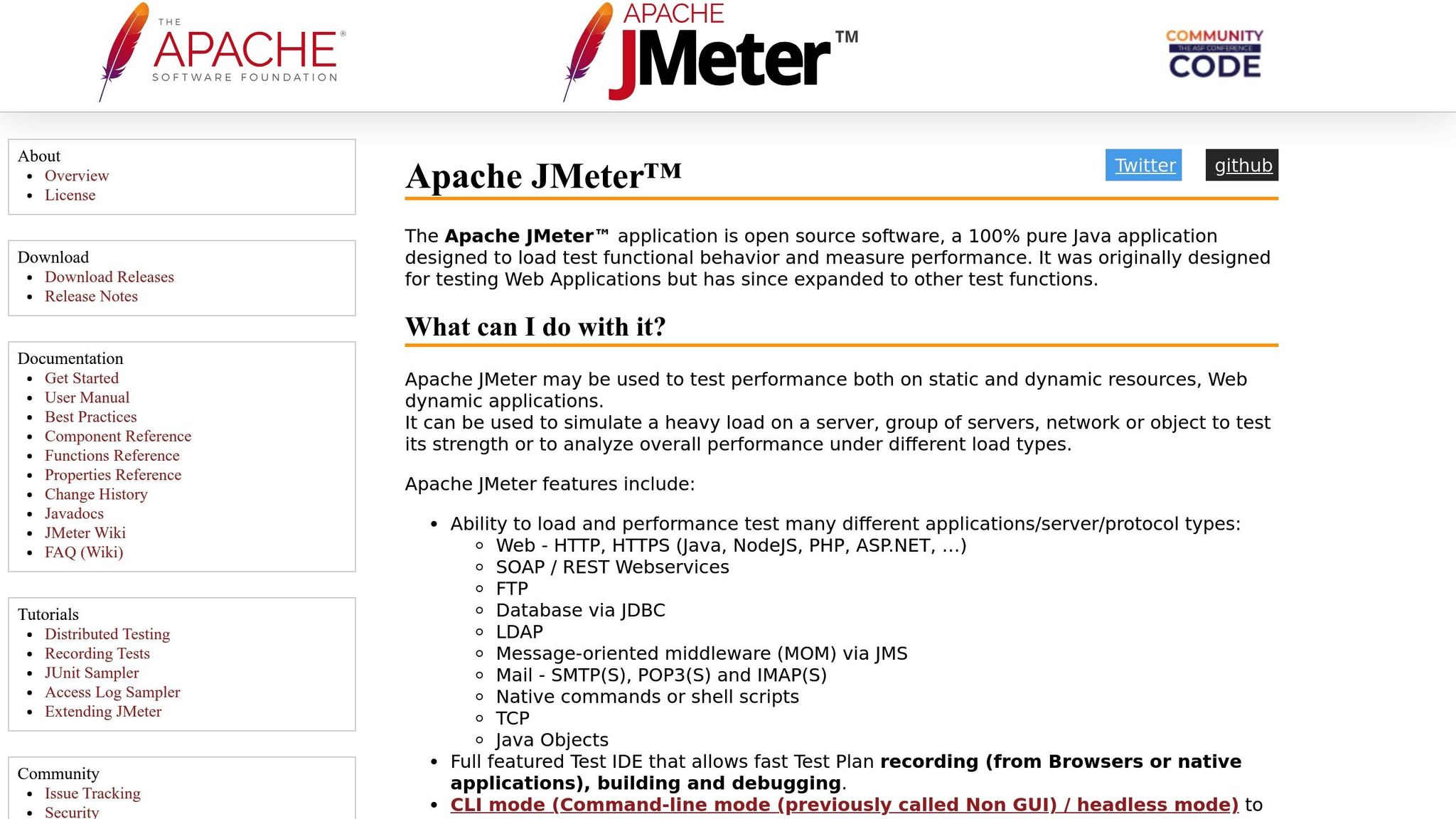
Apache JMeter stands out as one of the most trusted open-source tools for API performance testing. Developed by the Apache Software Foundation, it has earned its reputation through years of use in enterprise environments. With positive industry feedback and widespread adoption, JMeter remains a go-to choice for performance testing experts around the globe.
What makes JMeter so appealing is its combination of being completely free and offering features typically found in costly enterprise tools. Many commercial options come with hefty licensing fees, but JMeter provides powerful testing capabilities without financial barriers. This makes it an excellent choice for companies operating on tight budgets or those just beginning their performance testing efforts. Let's take a closer look at how JMeter meets the demands of enterprise API testing.
Protocol Support (REST, SOAP, GraphQL, and More)
JMeter supports a variety of protocols, including REST, SOAP, and GraphQL, with customizable request configurations to suit enterprise workflows. For REST APIs, it allows you to define custom headers, request bodies, and various authentication methods like OAuth, Basic Auth, and Bearer tokens.
When it comes to GraphQL, JMeter uses its HTTP Request sampler to execute queries and mutations. You'll need to format the request body in JSON and set the "Content-Type" header to "application/json." For SOAP services, JMeter natively handles XML-based requests and responses, ensuring smooth and efficient testing.
Seamless Integration with CI/CD Pipelines
JMeter fits effortlessly into continuous integration and deployment (CI/CD) workflows. Its command-line interface simplifies automation, making it compatible with popular CI/CD tools like Jenkins, GitLab CI, and Azure DevOps. You can automate test plan execution as part of your build process, generate detailed reports, and enforce performance thresholds to ensure APIs maintain quality as new updates are rolled out.
Customization and Scripting Flexibility
For more advanced testing needs, JMeter offers a high level of customization. You can create custom scripts to handle complex logic, generate dynamic test data, and validate responses in detail. Its extensive plugin library further enhances its functionality, adding features like advanced reporting and support for specialized test scenarios.
The platform’s GUI-based test plan creation is user-friendly enough for non-technical users, while its underlying XML structure makes it easy to integrate with version control systems. This balance allows both beginners and seasoned testers to tailor JMeter to their specific needs.
Scalable Testing for Large Enterprises
JMeter is built to handle large-scale testing. Its distributed testing capabilities allow you to simulate thousands of concurrent users across multiple locations. By configuring thread pools and optimizing memory settings, JMeter ensures efficient resource usage even under heavy loads.
That said, some users have noted that JMeter’s interface feels a bit outdated compared to newer tools. Additionally, mastering its more complex features can take time. Fortunately, JMeter’s extensive documentation and active community support help users overcome these challenges with ease.
2. Loadero
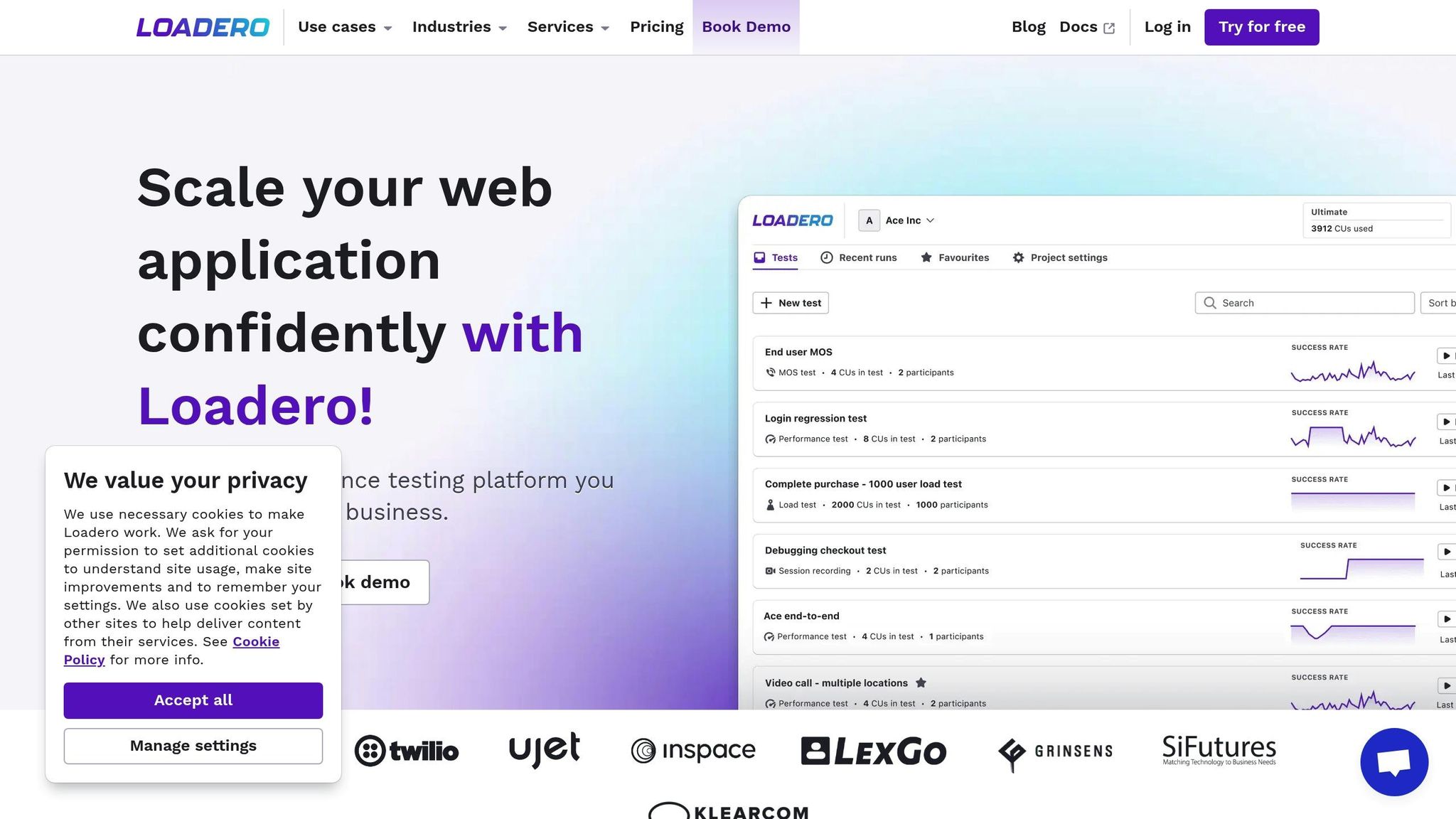
Loadero earns a spot on this list as a tool for enterprise-level API performance testing. While it's recognized as one of the top options in its category, the publicly available documentation for Loadero is somewhat limited. This means businesses may need to conduct their own evaluations to fully understand its capabilities. Additional tools with more detailed feature sets are discussed in the following sections.
3. Insomnia
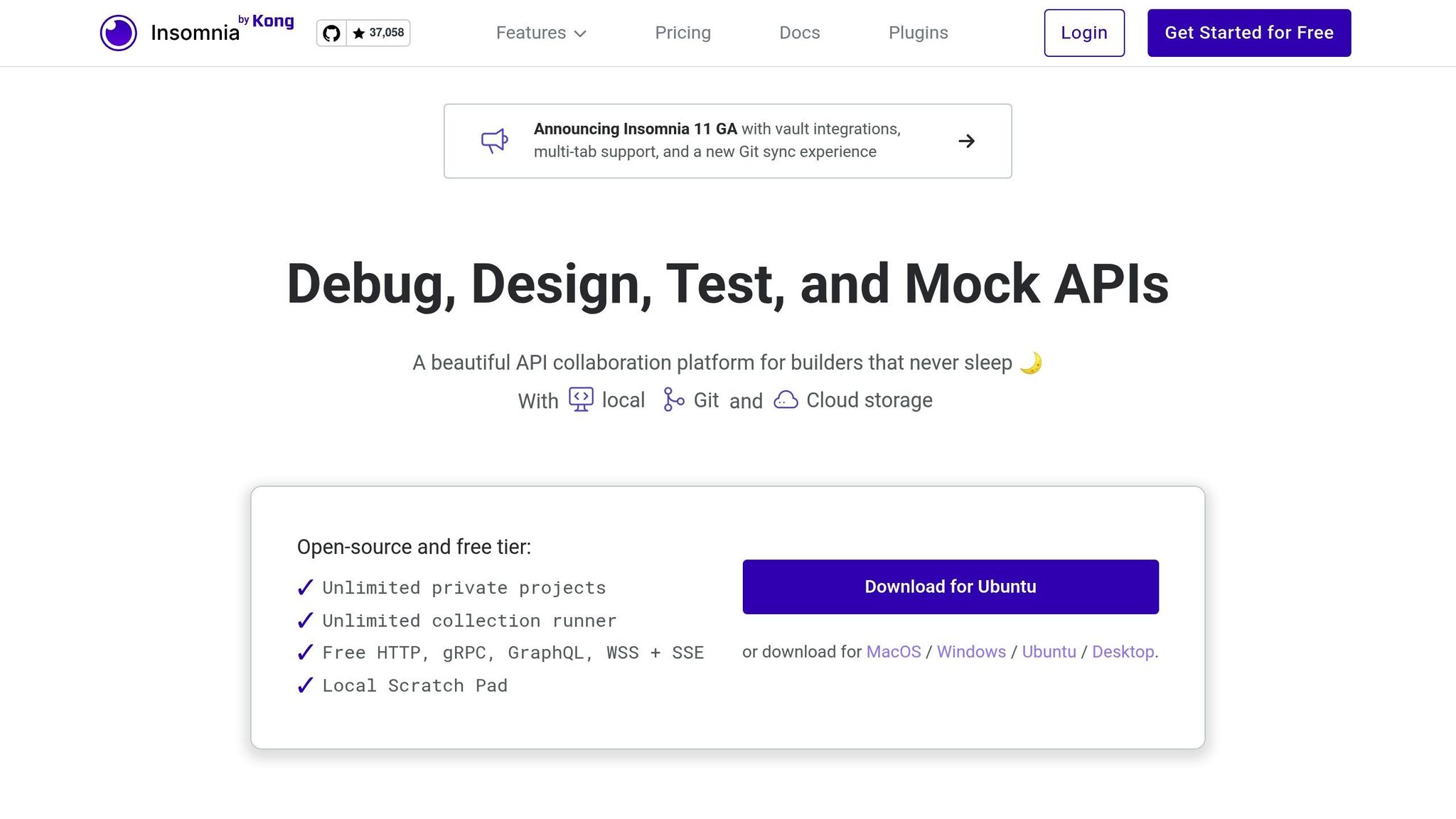
Insomnia is an open-source API platform designed for functional and integration testing. With the help of external monitoring tools, it can also handle performance testing.
Protocol Support
Insomnia works seamlessly with a variety of protocols, including HTTP, RESTful APIs, GraphQL, gRPC, SOAP, WSS (WebSockets Secure), SSE (Server-Sent Events), and WebSockets. This broad compatibility makes it a versatile tool for teams working with different API architectures, all from one platform. Its extensive protocol support ensures it can easily fit into automated workflows.
Integration with CI/CD Pipelines
With its command-line interface (CLI), Insomnia simplifies the automation of API testing within CI pipelines. This helps teams maintain consistent performance benchmarks throughout the development process.
Scalability for Enterprise-Level Testing
While Insomnia is ideal for small teams conducting initial API validation, scaling up to enterprise-level performance testing often requires pairing it with external monitoring solutions.
4. Karate Labs
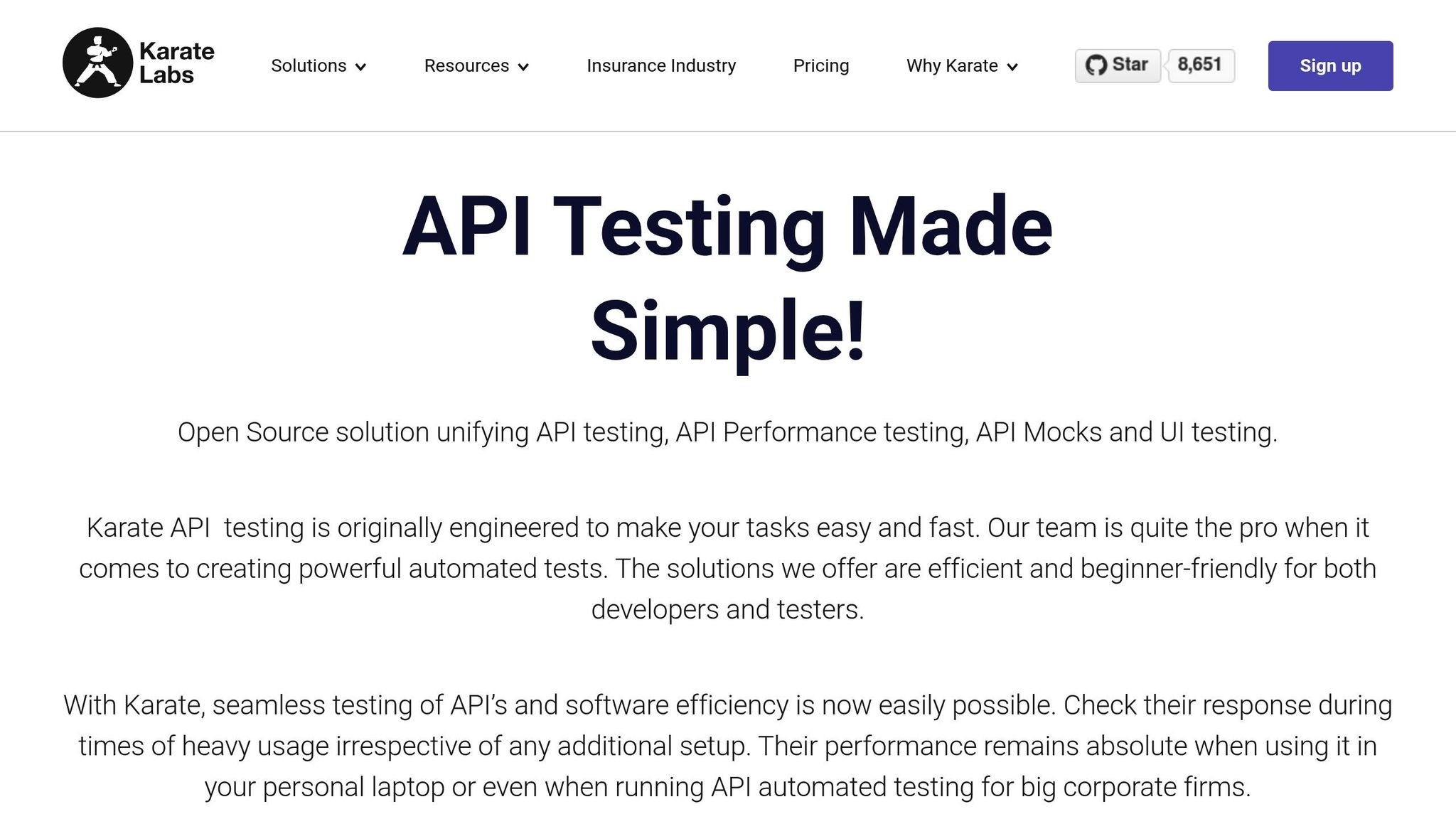
Karate Labs is a testing framework that combines API, UI, and performance testing into one package. Built on Cucumber-JVM, it uses a Behavior-Driven Development (BDD) approach, making it easier for all team members to contribute to test creation. Here's a closer look at its standout features.
Protocol Support
Karate Labs supports a variety of protocols, including HTTP/HTTPS, REST, SOAP, GraphQL, and JSON-RPC. It’s equipped to handle complex authentication scenarios like OAuth 2.0, JWT tokens, and custom headers. For real-time applications, its built-in WebSocket testing ensures smooth bidirectional communication.
With native JSON and XML processing, you don’t need external libraries to handle API responses. This simplifies setup and lets teams focus on crafting effective test cases instead of managing extra dependencies.
Integration with CI/CD Pipelines
Karate Labs works seamlessly with popular CI/CD tools such as Jenkins, GitLab CI, GitHub Actions, and Azure DevOps. It generates detailed HTML reports and supports JUnit XML output, ensuring compatibility with most continuous integration systems.
Its command-line interface (CLI) also supports performance testing in CI/CD pipelines, with the ability to fail builds if performance benchmarks aren’t met.
Customizability and Scripting Capabilities
The framework uses a domain-specific language (DSL) to write test scripts in plain English, making them easy to read and maintain. Teams can create reusable components and data-driven test cases without requiring advanced programming skills.
For more complex scenarios, Karate Labs supports JavaScript expressions within test scripts, offering flexibility for data manipulation and custom validations. Additionally, its built-in mock server allows teams to simulate API dependencies, enabling isolated and reliable test environments.
Scalability for Enterprise-Level Testing
Karate Labs supports parallel execution to distribute load efficiently and leverages Docker for horizontal scaling.
Its reporting tools provide detailed metrics such as response times, throughput, and error rates, helping teams pinpoint performance issues and improve system efficiency.
5. Selenium
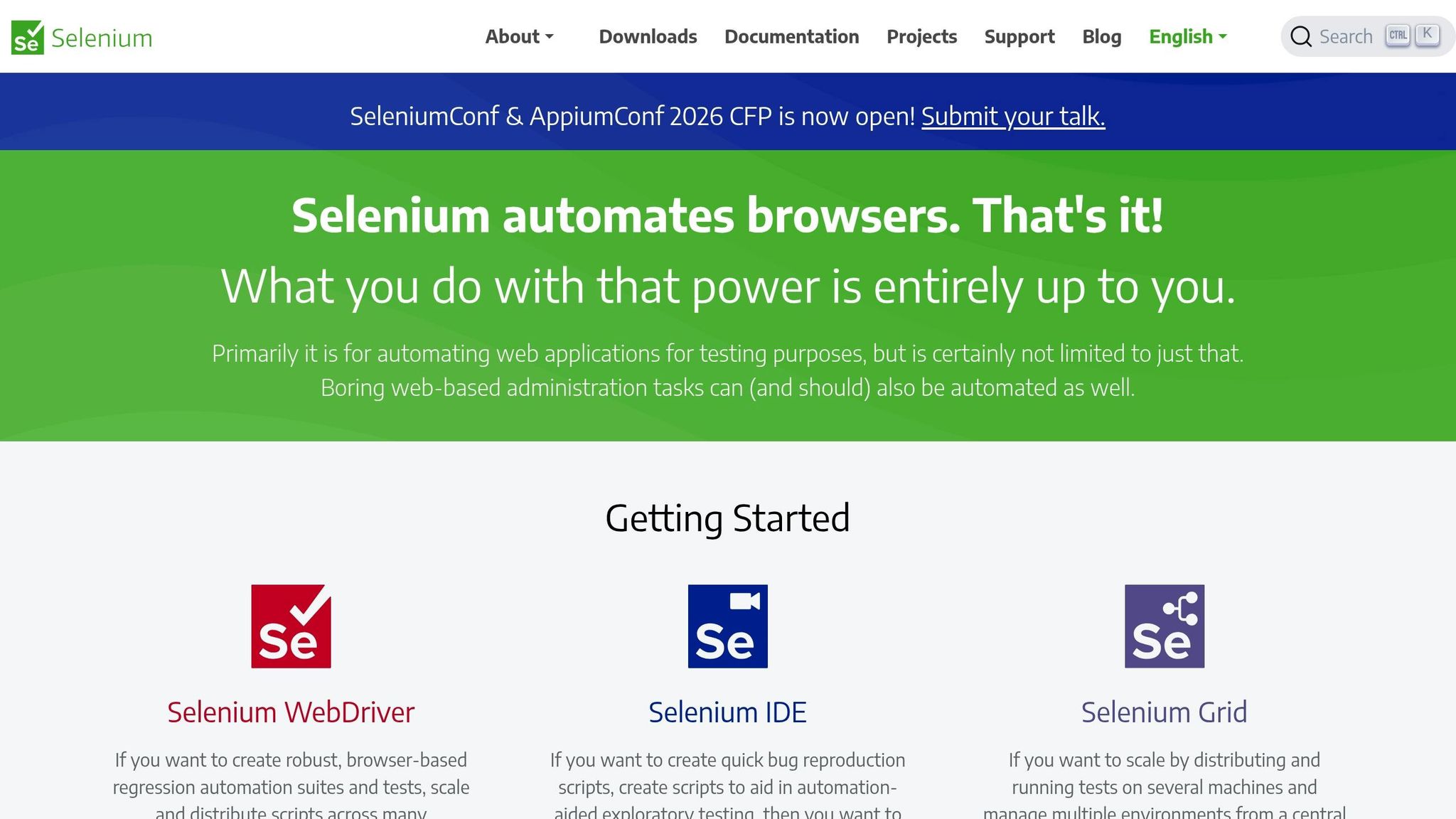
Selenium is widely recognized for web browser automation, but it’s not limited to just UI testing. It also supports backend performance validation, making it a useful addition to comprehensive performance testing strategies.
Integration with CI/CD Pipelines
When combined with frameworks like TestNG or JUnit, Selenium can produce XML reports and seamlessly integrate into CI/CD pipelines such as Jenkins, TeamCity, Bamboo, or Azure DevOps. This automated integration ensures quality checks are consistently applied, simplifying the CI/CD workflow.
Flexibility in Scripting
One of Selenium's strengths is its support for multiple programming languages. This flexibility allows testers to integrate HTTP client libraries into their scripts, making it possible to include API calls as part of broader testing processes. Keeping test scripts straightforward ensures they remain easy to manage and update.
Enterprise-Level Scalability
Selenium Grid is a game-changer for scaling tests. It allows distributed testing across multiple machines and browsers, enabling parallel execution that significantly reduces testing time. By combining Selenium Grid with Docker, teams can further enhance distributed, parallel testing capabilities, making it ideal for large-scale, enterprise-level projects.
6. Cypress
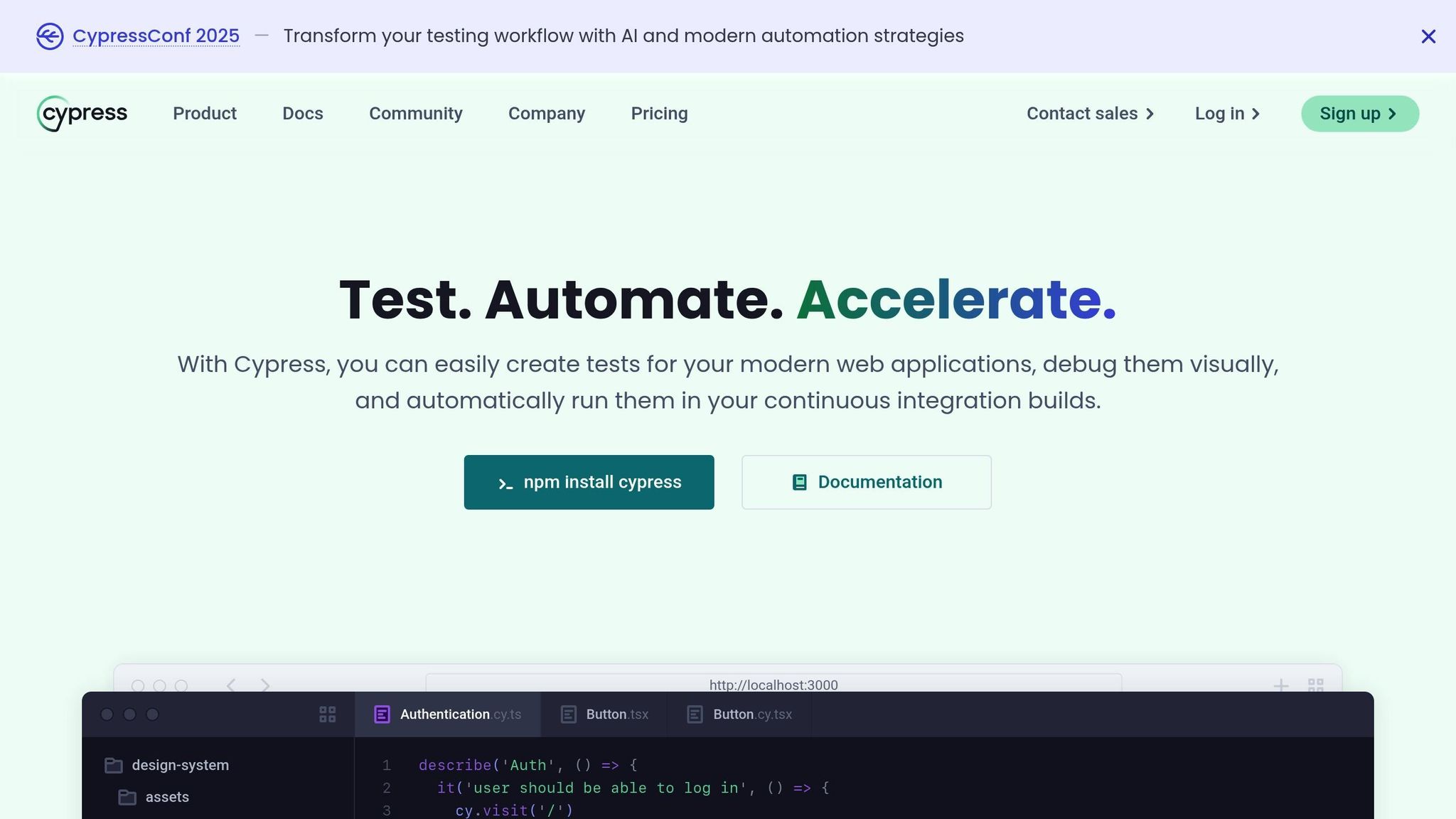
Cypress, originally designed for end-to-end web testing, has expanded its capabilities to include backend API testing, making it a versatile tool for enterprise use.
Protocol Support (REST, SOAP, GraphQL, etc.)
Cypress shines when it comes to REST API testing. Its built-in cy.request() command handles a wide range of HTTP methods, including GET, POST, PUT, DELETE, and PATCH, making it a reliable choice for testing RESTful services. For GraphQL, Cypress supports sending queries and mutations through HTTP requests, aligning well with modern API frameworks.
However, Cypress falls short in SOAP protocol support. Since it’s not specifically designed for SOAP, testers often need to implement workarounds or custom solutions to handle SOAP requests. The tool’s focus remains on RESTful and JSON-based APIs rather than XML-heavy protocols, which is where its strengths truly lie. These capabilities make it a solid choice for automation, particularly when integrated into CI/CD workflows.
Integration with CI/CD Pipelines
Cypress integrates seamlessly with popular CI/CD platforms like Jenkins, GitHub Actions, GitLab CI, and Azure DevOps. It supports generating detailed test reports in formats such as JUnit XML, which can be easily incorporated into continuous integration systems.
The Cypress Dashboard adds extra value for teams by offering features like analytics on test results, managing parallel test execution, and identifying flaky tests. By configuring CI/CD pipelines to automatically run Cypress tests on code commits, teams can ensure API functionality stays intact throughout the development process.
Customizability and Scripting Capabilities
One of Cypress’s standout features is its JavaScript-based scripting environment. Testers and developers can use familiar JavaScript syntax to write custom commands, reusable functions, and complex test logic. The support for async/await makes scripts easier to read and maintain.
Cypress is highly customizable through plugins and configurations. Teams can tweak default behaviors, add custom reporters, and integrate third-party libraries to expand its functionality. Its command chaining syntax also allows for combining API calls with assertions and data validations in a smooth, readable flow.
Scalability for Enterprise-Level Testing
While Cypress supports parallel execution through its Dashboard, it runs tests in a single browser instance, which can limit its ability to handle heavy concurrent API loads. For enterprise environments, Cypress works best when paired with other tools designed for performance testing. Teams often use Cypress for functional and integration API testing, leaving load and stress testing to specialized tools.
Docker support ensures consistent test execution across environments. However, for high-volume testing scenarios, Cypress alone may not suffice. Its strengths lie in functional API testing, making it a great addition to an enterprise testing strategy when complemented by dedicated performance testing tools.
sbb-itb-5174ba0
7. Postman
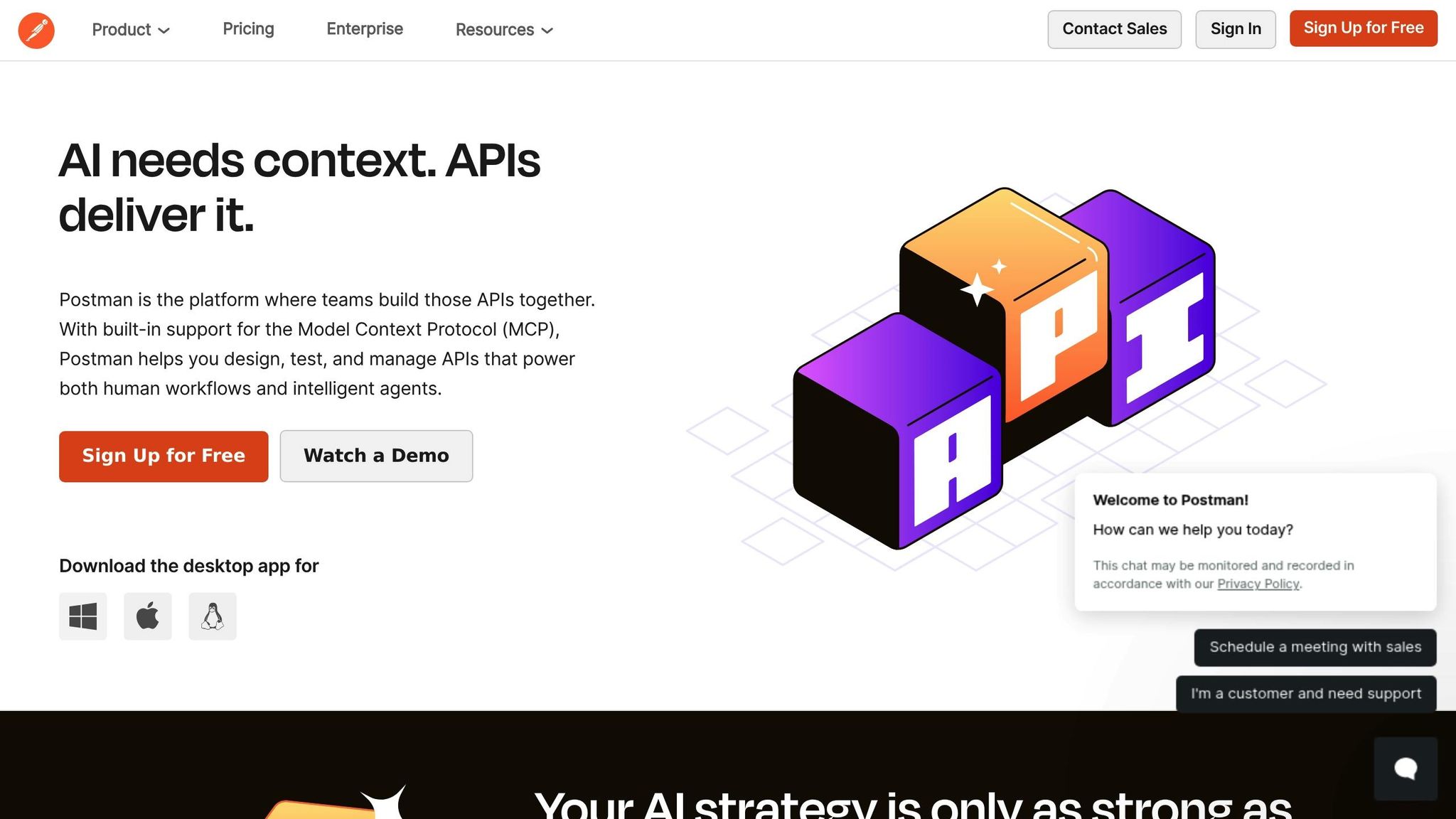
Postman has grown from a simple browser extension into a full-fledged API platform, offering a user-friendly interface alongside powerful tools for API testing.
Protocol Support (REST, SOAP, GraphQL, etc.)
Postman shines when it comes to REST API testing, as it supports all the standard HTTP methods like GET, POST, PUT, DELETE, and PATCH. It also handles GraphQL queries and mutations with ease. While it can send SOAP requests, its features for SOAP testing are somewhat limited - it doesn’t include advanced options like WSDL parsing or in-depth XML validation, which are often required for more intricate SOAP workflows. Additionally, Postman supports protocols like gRPC and WebSockets, broadening its versatility.
Integration with CI/CD Pipelines
Postman pairs seamlessly with CI/CD workflows through Newman, its command-line companion. This allows you to run Postman collections in environments such as Jenkins, GitHub Actions, or GitLab CI. Newman also offers flexibility in output formats, including JSON, XML, and HTML, and supports scheduled monitoring to automatically execute collections. This ensures teams are promptly alerted to any performance issues.
Customizability and Scripting Capabilities
With JavaScript-based pre-request and test scripts, Postman enables users to introduce custom logic for tasks like dynamic data generation, parameter tweaking, and response validation. Its flexible variable system and shared libraries make it easier to switch between development, staging, and production environments. These features also encourage code reuse and efficiency.
Scalability for Enterprise-Level Testing
Postman’s Collection Runner allows requests to be executed in parallel with configurable virtual users, making it suitable for moderate load testing. For larger teams, Postman’s Teams and Enterprise plans include features like collaboration tools, role-based access controls, and centralized workspace management. With built-in tools for API documentation and mock servers, it supports API-first development approaches. However, for high-volume load testing, specialized tools are recommended. All in all, Postman offers a well-rounded set of features, making it a strong contender for API testing at various scales.
8. k6
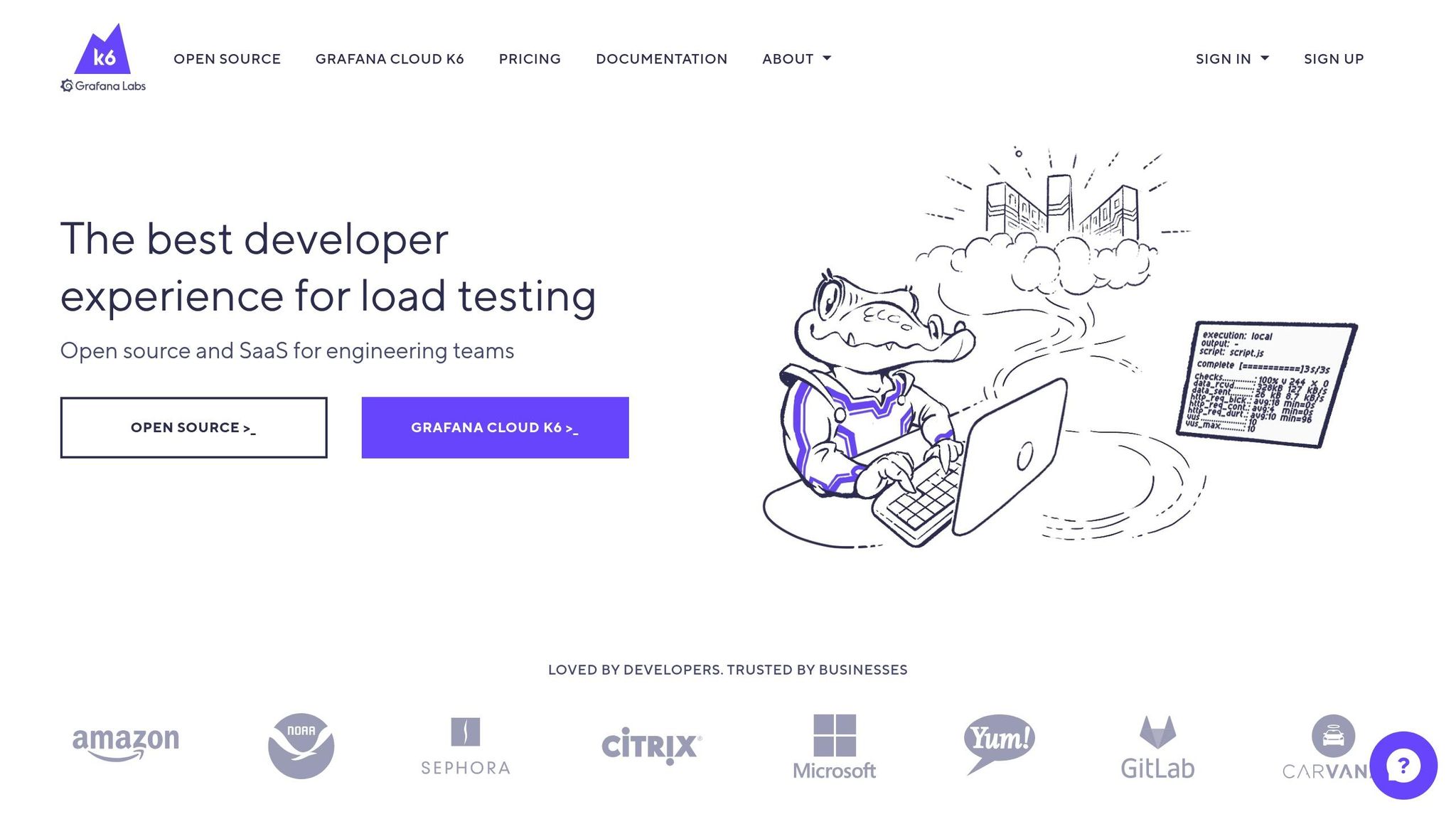
k6 is a performance testing tool built with JavaScript and designed with developers in mind. Created by Grafana Labs, it streamlines the process of running efficient, high-quality tests. Let’s dive into its protocol support and other key features.
Protocol Support (REST, SOAP, GraphQL, etc.)
k6 is particularly strong when it comes to HTTP/1.1 and HTTP/2, making it a great choice for testing REST APIs. It also includes native support for GraphQL queries and mutations, which simplifies testing for more complex GraphQL endpoints. For real-time APIs, k6 handles WebSocket connections seamlessly.
While SOAP requests can be sent using k6’s HTTP capabilities, the tool doesn’t offer advanced SOAP-specific features like WSDL parsing or detailed XML validation. However, it shines in its support for modern web protocols and even accommodates gRPC testing through extensions, making it a solid option for microservices-based systems.
Integration with CI/CD Pipelines
k6 fits neatly into CI/CD workflows, thanks to its CLI-based integration with tools like Jenkins, GitHub Actions, GitLab CI, and Azure DevOps. Test results can be exported in various formats, including JSON, XML, and JUnit, which makes it easy to incorporate them into existing reporting frameworks.
One of its standout features is k6 Cloud, which enables large-scale load testing without the hassle of managing infrastructure. This hybrid approach allows developers to write and debug tests locally while scaling up to cloud-based tests for high traffic simulations when necessary.
Customizability and Scripting Capabilities
With a JavaScript-based scripting environment, k6 is highly approachable for web developers. It supports ES6 modules, enabling the creation of reusable libraries and custom logic for tasks like data generation or advanced test scenarios with conditional flows.
The tool also provides detailed metrics and allows teams to define their own custom metrics, ensuring they can track the performance data that matters most. Its built-in check system enables precise validations, and the thresholds feature automatically evaluates test success or failure based on predefined performance benchmarks.
Scalability for Enterprise-Level Testing
k6 is designed to handle large-scale testing efficiently. A single instance can produce a significant load while using minimal system resources, which is a big advantage over many traditional testing tools. For even larger tests, k6 supports distributed testing across multiple machines, enabling teams to simulate extensive user loads.
For enterprises looking to push the limits, k6 Cloud offers managed infrastructure capable of simulating millions of virtual users. Features like geographic load distribution allow teams to test APIs from multiple global locations at the same time. This flexibility - combining local development with cloud-based scalability - makes k6 a powerful choice for organizations with demanding testing needs.
9. Gatling
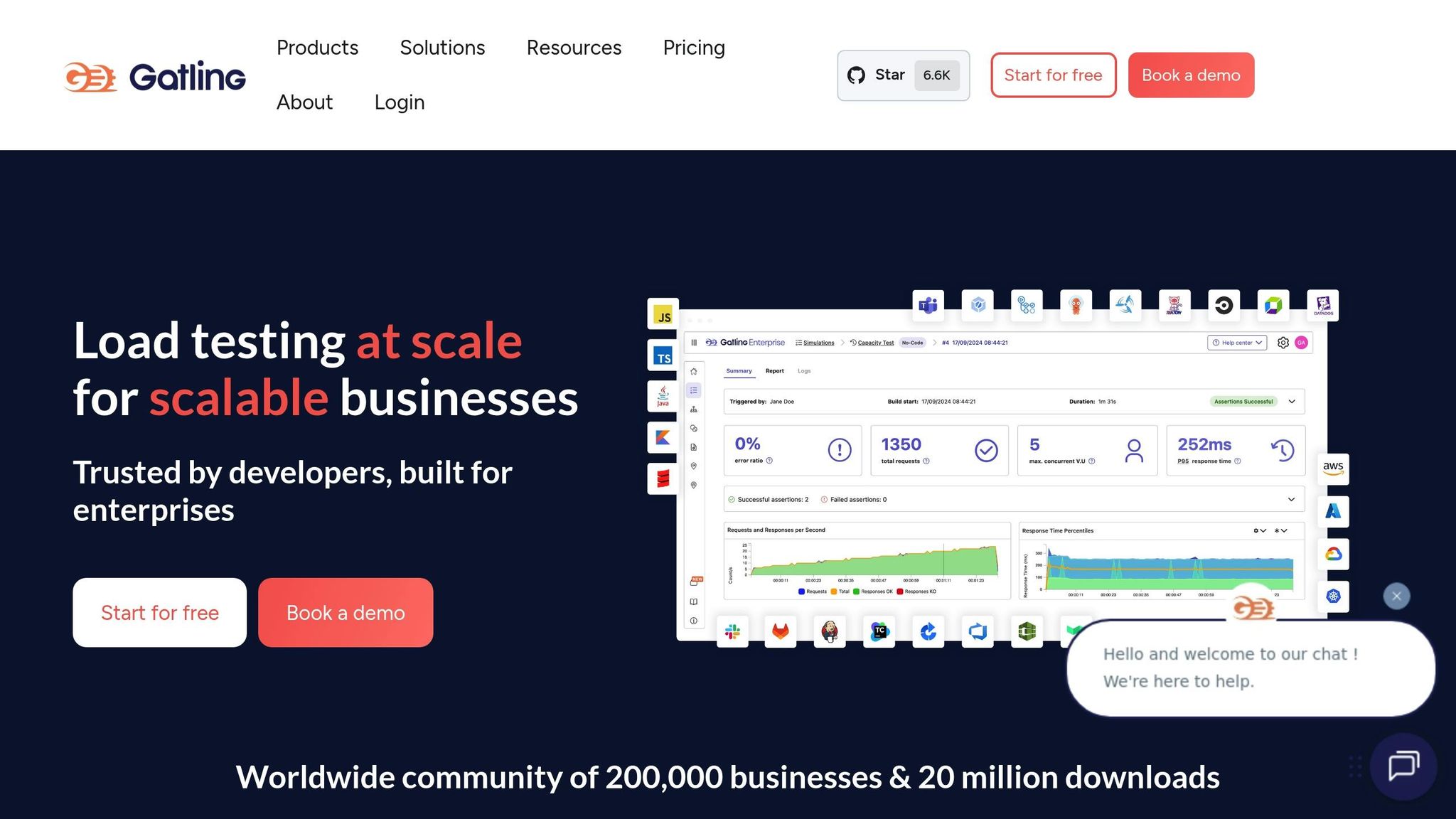
Gatling is a powerful load testing framework built on Scala and Akka, designed to handle massive concurrent user loads while using minimal resources. Created by GatlingCorp, this open-source tool has become a go-to for enterprises needing to simulate thousands of users and capture detailed performance data. Its robust protocol support and scalable design make it a standout choice for enterprise-level load testing.
Protocol Support (REST, SOAP, GraphQL, etc.)
Gatling shines when it comes to testing HTTP/1.1 and HTTP/2, making it an excellent option for REST API testing. It also supports WebSockets and Server-Sent Events (SSE), which are crucial for real-time application testing. While it doesn’t natively support GraphQL, developers can still test GraphQL endpoints by leveraging Gatling's versatile HTTP capabilities.
For SOAP testing, Gatling can handle XML-based requests through its HTTP module. However, it lacks advanced SOAP-specific features like automatic WSDL parsing, which might require additional manual setup.
Integration with CI/CD Pipelines
Seamless integration into CI/CD workflows is essential, and Gatling delivers here. It works well with popular tools like Jenkins, Bamboo, TeamCity, and GitLab CI. It also supports Maven and Gradle for build automation and generates JUnit XML reports for easy integration into your pipeline.
What sets Gatling apart is the ability to set performance thresholds directly in test scripts. This ensures that builds fail automatically if response times exceed defined limits, helping teams maintain performance standards throughout the development process.
Customizability and Scripting Capabilities
Gatling’s scripting is powered by a Domain Specific Language (DSL) based on Scala, which is accessible even for developers familiar with Java. Its simulation scripts can model complex user behaviors using conditional logic, loops, and dynamic data feeds from sources like CSV, JSON, or databases.
Custom checks allow validation of response content, headers, and status codes, while its built-in assertion system lets you define performance benchmarks for metrics like response time percentiles and throughput. This level of control makes it easier to tailor tests to specific needs.
Scalability for Enterprise-Level Testing
Gatling’s asynchronous, non-blocking architecture, powered by Akka, is what makes it possible to simulate hundreds of thousands of users on a single machine. For larger-scale testing, it supports distributed load testing and offers the Gatling Enterprise platform. This enterprise-grade solution enables cloud-based simulations from multiple locations, complete with real-time monitoring and tools for performance regression detection. Whether you're testing locally or in the cloud, Gatling provides the scalability needed for enterprise demands.
10. ReadyAPI (SoapUI Pro)
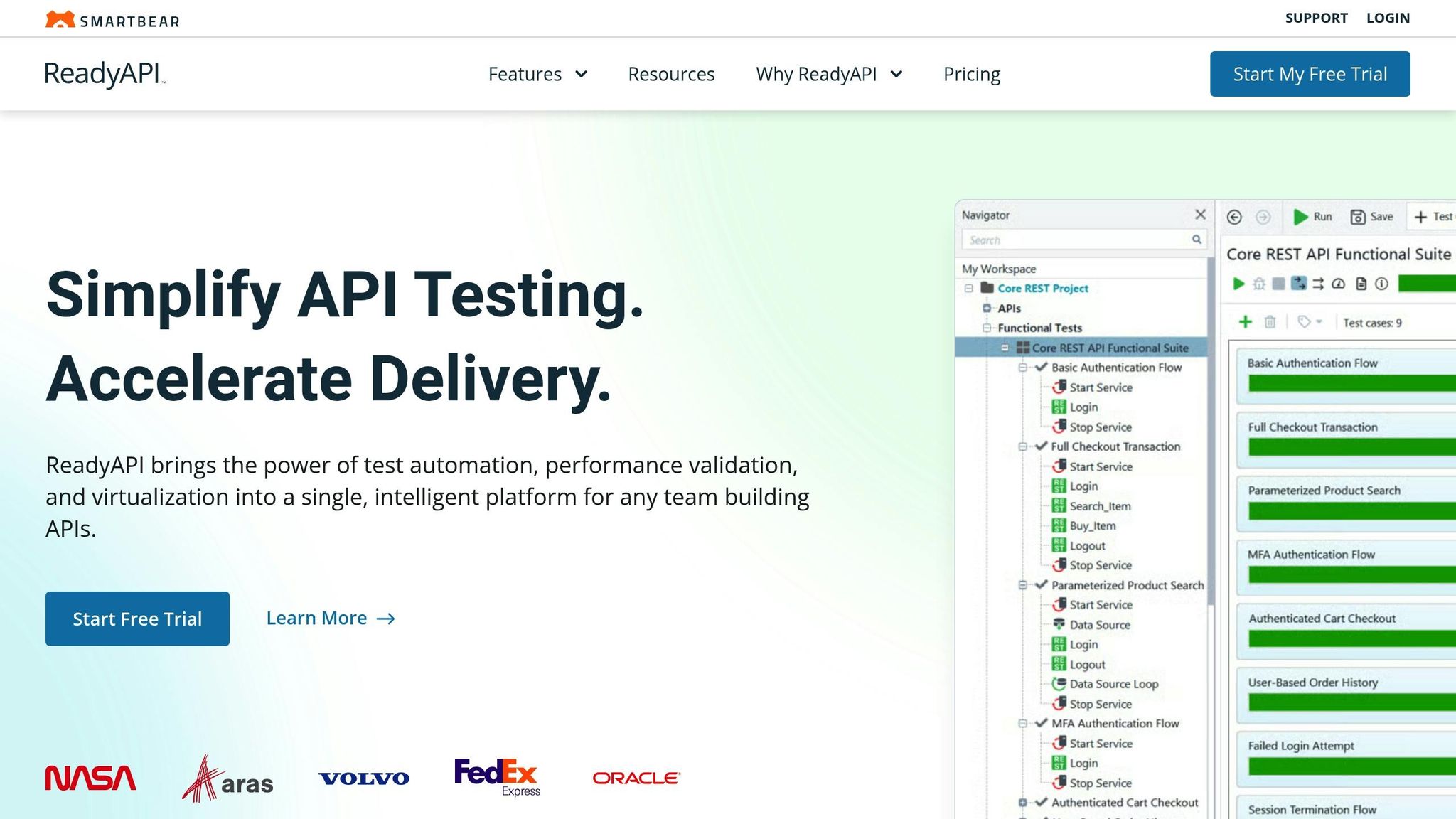
ReadyAPI, previously known as SoapUI Pro, is SmartBear's enterprise-focused API testing platform. Over the years, it has transitioned from an open-source tool to a comprehensive solution designed for large-scale API quality assurance. It combines functional, security, and performance testing into one streamlined environment. With its extensive protocol support and enterprise-grade features, ReadyAPI is a go-to choice for organizations aiming to ensure API reliability throughout complex development cycles.
Protocol Support (REST, SOAP, GraphQL, etc.)
ReadyAPI offers an impressive range of protocol support, including REST, GraphQL, gRPC, Kafka, SOAP, and XML-RPC. This versatility allows teams to handle diverse API ecosystems with ease, making it suitable for a variety of testing scenarios.
Integration with CI/CD Pipelines
ReadyAPI is built to fit seamlessly into modern CI/CD workflows. It integrates with tools like Jenkins, Docker, and Azure DevOps, enabling testing at every stage - from local development to production. Teams can execute tests by suite, tag, or project, and manage multiple environments such as development, QA, or staging through flexible configurations.
The platform also includes dedicated command-line runners for automating functional, security, and performance tests. For teams leveraging containerized setups, ReadyAPI provides Docker images for testing environments. Additionally, it supports Maven integration, making it ideal for headless machine testing. These features, combined with its customization options, make it a powerful tool for continuous testing.
Customizability and Scripting Capabilities
ReadyAPI supports scripting with Groovy and JavaScript, giving users the flexibility to tailor tests to their specific needs. Groovy scripts, in particular, can tap into the ReadyAPI object model for deeper customization. Plus, reusable custom modules can be created to streamline workflows across multiple projects.
Scalability for Enterprise-Level Testing
For large-scale testing needs, ReadyAPI provides robust scalability. It leverages TestRunner and TestEngine to distribute test execution across multiple environments. Its modular design, combined with Docker images and LoadUI integration for advanced load testing, ensures it can handle demanding enterprise requirements. The platform also supports extensive customization through scripting and plugins, making it adaptable to various testing challenges.
Tool Comparison Table
Choosing the right API testing tool depends on your specific needs. Below is a summary of key features to help you make an informed decision.
| Tool | Protocol Support | CI/CD Integration | Scripting Capabilities | Scalability | Best For | Pricing Model |
|---|---|---|---|---|---|---|
| Apache JMeter | HTTP, HTTPS, SOAP, REST, FTP, JDBC | Jenkins, Bamboo, TeamCity | Java, Groovy, BeanShell | High (distributed testing) | Enterprise load testing | Free (open source) |
| Loadero | HTTP, HTTPS, WebRTC | GitHub Actions, GitLab CI | JavaScript | Medium to High | Browser testing | Subscription |
| Insomnia | REST, GraphQL, gRPC, WebSockets | Limited native support | JavaScript plugins | Low to Medium | API development, debugging | Freemium |
| Karate Labs | REST, SOAP, GraphQL, WebSockets | Jenkins, Maven, Gradle | Gherkin DSL, JavaScript | Medium | BDD testing, automation | Free (open source) |
| Selenium | Web protocols via browsers | Jenkins, Azure DevOps, GitHub Actions | Java, Python, C#, JavaScript | High (Selenium Grid) | Web application testing | Free (open source) |
| Cypress | HTTP, HTTPS via browser | GitHub Actions, CircleCI, Jenkins | JavaScript, TypeScript | Medium | Modern web apps, e2e testing | Freemium |
| Postman | REST, SOAP, GraphQL, WebSockets | Newman CLI with CI tools | JavaScript (pre/post scripts) | Medium | API development, collaboration | Freemium |
| k6 | HTTP, WebSockets, gRPC | Jenkins, GitHub Actions, GitLab CI | JavaScript (ES6) | High (cloud scaling) | Developer-centric testing | Freemium |
| Gatling | HTTP, WebSockets, JMS | Jenkins, Maven, SBT | Scala DSL | High (clustering support) | High-performance testing | Open source + Enterprise |
| ReadyAPI | REST, SOAP, GraphQL, gRPC, Kafka | Jenkins, Docker, Azure DevOps | Groovy, JavaScript | High (TestEngine distribution) | Enterprise API testing | Commercial license |
Key Insights for Selecting a Tool
For Enterprise Teams: Tools like ReadyAPI and Apache JMeter are ideal for enterprise-level testing. ReadyAPI stands out with its commercial support and advanced security testing, while JMeter offers powerful distributed testing at no cost.
For Developer-Centric Workflows: If you're part of a development team, k6 and Cypress are great choices. k6's JavaScript-based approach aligns well with modern development practices, while Cypress provides robust debugging tools for web applications.
For Cost-Conscious Teams: Open-source tools such as Apache JMeter, Karate Labs, and Selenium deliver powerful testing capabilities without licensing fees. These tools can handle a wide range of testing needs with the right configuration.
For Protocol Diversity: ReadyAPI shines in handling diverse protocols, from traditional SOAP to modern options like Kafka and gRPC. Karate Labs also provides strong multi-protocol support with its unified testing approach.
For Cloud Scaling: When scalability is a priority, k6 and Gatling are excellent options. k6's cloud service scales effortlessly to thousands of virtual users, while Gatling's clustering support allows distributed testing across multiple machines.
Balancing Performance and Ease of Use
While tools like JMeter and Gatling excel in performance testing, they may require more technical expertise. On the other hand, user-friendly options like Postman and Insomnia simplify API testing but might need extra setup for CI/CD integration. Command-line tools such as k6 and Gatling are better suited for automated pipelines but may pose a steeper learning curve for less technical team members.
This table and analysis aim to help you identify the best tool for your team's specific needs, whether it's enterprise-grade performance, developer-friendly workflows, or cost-effective solutions.
Conclusion
Selecting the right API testing tool plays a crucial role in ensuring your application's performance and reliability. Each tool we’ve discussed offers distinct strengths, from Apache JMeter's robust distributed testing features to Postman's intuitive interface and k6's JavaScript-driven approach.
The key is to align the tool with your team's skills, budget, and specific requirements. Larger enterprises dealing with complex protocols might lean toward ReadyAPI for its advanced capabilities, while startups often find open-source options like Apache JMeter or Karate Labs to be cost-effective and efficient. Teams already comfortable with JavaScript can make the most of k6 or Cypress, thanks to their familiar syntax and seamless integration with CI/CD pipelines. For a more comprehensive strategy, consider combining tools - for instance, using Postman during development, Gatling or JMeter for load testing, and k6 for automation.
As your API testing strategy grows, monitoring and analytics become equally important. Tools that provide real-time insights, performance dashboards, and business intelligence can help refine and optimize your API performance. For a curated list of such tools, the Marketing Analytics Tools Directory (https://topanalyticstools.com) is a valuable resource. Whether you need monitoring dashboards, advanced metrics analysis, or A/B testing platforms to validate improvements, this directory categorizes solutions designed to support data-driven decision-making.
Ultimately, the best API testing tool is the one your team consistently uses. Start with a tool that fits your current needs and technical expertise, and expand your toolkit as your testing demands evolve. Investing in effective API testing not only enhances user experience and reduces downtime but also drives better outcomes for your business.
FAQs
What should I look for when selecting an API performance testing tool for my team?
When choosing an API performance testing tool, prioritize its ability to handle your application's expected traffic levels - and even exceed them if needed. This ensures your tool is ready for growth and unexpected surges.
Ease of use is another key factor. Select a tool that matches your team’s technical skills and integrates smoothly into your existing workflow. A complex tool might slow things down, so simplicity and compatibility are critical.
Check that the tool supports the protocols your API relies on. Additionally, it should provide detailed, exportable test results to help you evaluate how your API performs under different conditions, like heavy traffic or stress testing. Lastly, think about your specific project requirements. Whether it's testing peak load times or simulating real-world usage, the right tool should align closely with your goals.
How do JMeter and ReadyAPI approach large-scale API performance testing differently?
JMeter is built for large-scale API performance testing, thanks to its distributed testing architecture. This setup allows tests to run across multiple machines simultaneously, making it possible to simulate thousands of virtual users. It's a solid choice for handling complex testing scenarios that require high scalability.
On the other hand, ReadyAPI focuses on user-friendly design with an intuitive interface and robust enterprise integration options. Its flexible licensing model ensures it can scale to meet the needs of businesses looking for streamlined workflows and enterprise-grade features.
While some tools provide basic support for large-scale testing, they often fall short of JMeter's advanced scalability or ReadyAPI's enterprise-oriented capabilities, limiting their usefulness in more demanding environments.
Can API performance testing tools be integrated into CI/CD pipelines, and which ones work best for this?
Many API performance testing tools are built to integrate smoothly into CI/CD pipelines, simplifying the automation of testing within the development lifecycle. Tools like Gatling, NeoLoad, and WebLOAD are tailored to work with widely-used CI/CD platforms such as Jenkins, GitLab, and Bamboo.
These tools offer features like real-time alerts, comprehensive reporting, and plugin support, ensuring they fit seamlessly into enterprise workflows. By using these tools, teams can catch performance issues early and consistently deliver reliable applications.


